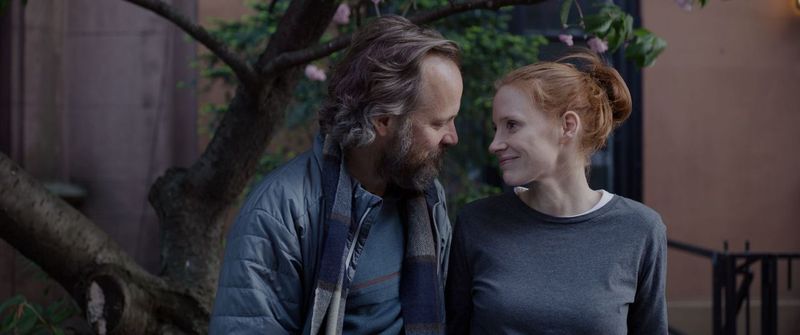Film Review of Memory (Michel Franco, USA, 2023) by Dr Khalid Ali, film, and media correspondent
Film is on UK and Irish cinemas from Friday 23.2.2024, https://memoryfilm.uk/

Michel Franco, award-winning Mexican film director (figure 1), is a keen observer of the nature and dynamics of relationships between ailing patients and their paid carers. In ‘Chronic’ (Mexico, France, 2015), David (Tim Roth) is a home carer who employs unorthodox practices, crosses professional boundaries, assumes some of his patients’ identities and engages in assisted suicide. In his latest film, ‘Memory’, Franco tells the story of a more endearing character, Sylvia (Jessica Chastain), a single mother who takes a job as a carer for Saul (Peter Sarsgaard), a middle-aged man diagnosed with early-onset dementia. In the opening scene of the film, we are introduced to Sylvia in an Alcoholics Anonymous (AA) meeting where she is silent and withdrawn. At home she is overprotective of her teenage daughter Anna (Brooke Timber).
Sylvia is deeply traumatised by the memory of being raped in high school, but her actual recall of the perpetrators is fragmented and unreliable. Initially she believes that Saul had been one of the group who gang-raped her. Hoping that he will come to serious harm, she abandons him in a park after taking his identity badge. However, she later realises that he was not, in fact, one of the perpetrators. To make amends for her wrongful accusation, she agrees to work as his carer. A gentle loving relationship blossoms between the two troubled souls, a connection that is met with serious disapproval from their respective families, including Saul’s brother Issac (Josh Charles), and Sylvia’s mother Samantha (Jessica Harper). The relationship of Sylvia and Saul moves from mutual dependency to role reversal, where Saul becomes the protector of Sylvia. Now they are both able to create new memories that might lead to healing (figure 2).
Writer/ director Franco explores several themes in this multi-layered film: the morality of exacting revenge on a person who is vulnerable and frail, the agency and autonomy of those living with dementia; and the potential for salvation that comes with letting go of past traumas. The paradoxical role of memory is also introduced: While people are justified in asserting their identity and personhood by holding on to their past experiences, some of their memories, the ones that can be a source of pain and suffering, are best forgotten. In this instance, Sylvia’s traumatic memory of being raped generated disabling emotions that she was attempting to numb by alcohol addiction.
Franco intentionally unsettles and surprises the viewer by presenting his characters as unreliable witnesses of their past lives, for example, Sylvia’s faltering grasp of her rape incident, and Saul’s disorientation in a corridor in Sylvia’s house where he can’t remember her room. Still, the characters’ vulnerability is precisely why the audience empathises with them. Both Jessica Chastain and Peter Sarsgaard deliver career-best performances, Sarsgaard awarded the Volpi Cup for best actor in Venice International Film Festival in 2023. Franco clarifies that ‘’Peter was not acting ‘demented’, but was playing ‘Saul’ as a man with dementia, someone who had been a unique person before the diagnosis and remains so afterward, retaining his own particular characteristics, feelings, and emotions. The purpose of creating a character with early-onset dementia is to emphasise the uncertainty of how the disease will progress, and how a person will react. Does such a person strive to keep living, or does he retire from life? I personally find the second option very sad, but this often is a way of life that families of people living with dementia choose for them, in a well-intended but misguided attempt to remove them from life as a protection. These questions came to me partly out of fear; as a writer and a person, I fear that one day I might suffer from dementia’’.
Memory as a concept is analysed throughout the film, with a focus on the ‘collective memory’ of Sylvia’s family and hidden secrets of her abusive father, and the resultant ‘emotional memory’ that explains their current estrangement. ‘Sensory memory’ is also highlighted in a scene where Saul forgot what he usually orders in a restaurant he regularly frequents, but he remembers the fact that he enjoys his order, and that tasteful memory is enough to make him happy in the moment. Franco says that in that scene, he was presenting Saul as a romantic person who is trying to charm Sylvia with humour.

In our zoom interviews Franco denied that he was trying to be ‘too clever’ by dissecting the collective, emotional, and sensory variants of memory. Rather, his starting point as a writer was to follow two people meeting again at a class reunion, one of whom has dementia and does not remember much of their school memories. Franco adds ‘’my working process does not tackle concepts. I want to create a multi-layered story, and for that I want to make sure that the story is not too simple. While my film is a ‘love story’ I do not set out to write a ‘love story’ or a film about dementia. I was keen not to romanticise dementia. Let us not kid ourselves, dementia is a challenging disease, and can be heart-breaking’’.
‘Memory’ is a thought-provoking film that rewards its viewers by inviting them to reflect on and interpret their memories—memories with all their unreliability and paradoxes.